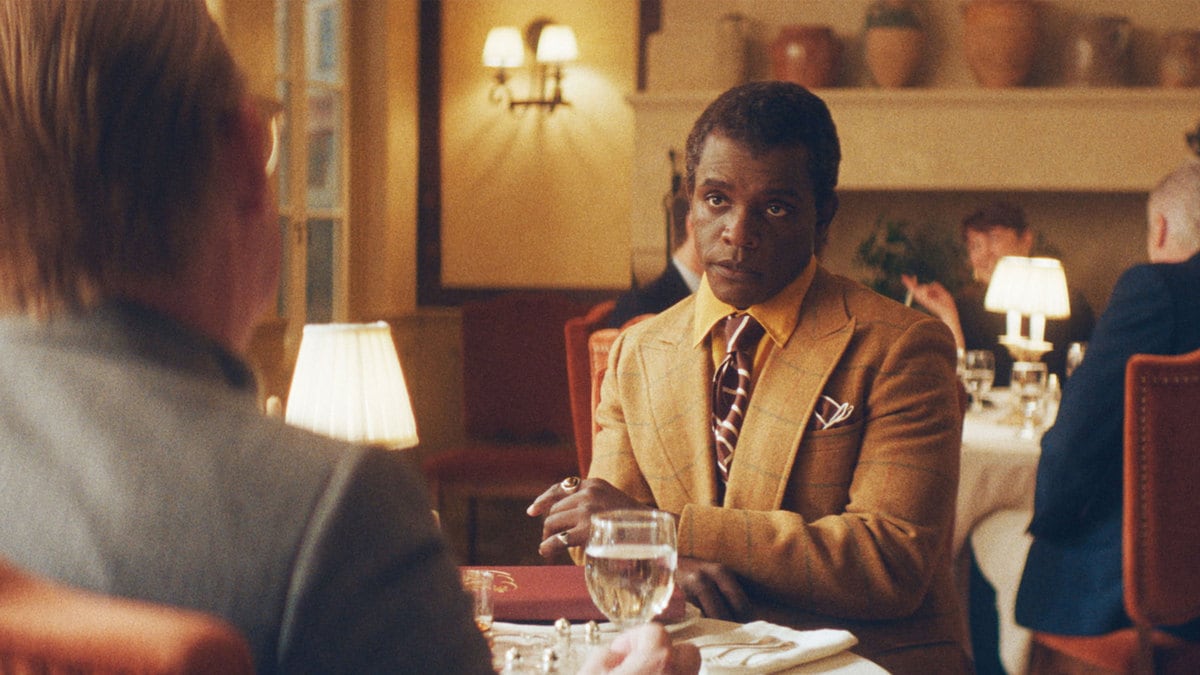This week on Feud: Capote vs. The Swans, we’re back in 1975. Truman Capote (Tom Hollander) has just published his doozy of a short story in Esquire, which, if you already forgot, thinly fictionalized the scandalous lives of his swans. Babe Paley (Naomi Watts) and Slim Keith (Diane Lane) are avoiding Truman like the plague. Truman has spiraled into writer’s block. And Feud is getting a bit tedious, going into the fourth week of what’s starting to feel like the same old, same old.
Truman can’t cope with the reactions to his Esquire story. Bill Paley (Treat Williams) curses Truman out on the phone, telling the writer to move to Patagonia and die alone—ouch. Pills and alcohol smoothie concoctions don’t make Truman feel any better, but a call from his old pal James Baldwin (Chris Chalk) lifts his spirits. James drags Truman back to La Côte Basque, although Truman fears he will be flayed alive if he sets foot in that swan-infested joint ever again. But if La Côte refuses them entry, that will be a brilliant story in and of itself, says James.
For whatever reason, James is committed to helping Truman stop feeling miserable for himself. James gives Truman some convoluted reasoning as to why he’d like to offer help—something about how gay men have no sense of community, especially in the literary world—but this still feels odd. Over the course of the episode, which is almost entirely spent between James and Truman, James not once talks about himself or his writing. He devotes himself to assisting Truman, and in doing so, becomes a bit of a racist cliche: Here is a Black man, swooping in to save this white man from depression and alcoholism, pushing him toward working on his next book. But will the white man help the Black man in return? God, no!
James starts off his quest to fix Truman Capote by asking about all the horrible things that weren’t in the Esquire story. Maybe this will drum up some inspiration for Truman to continue slandering the swans. For one, the swans have affairs just like their husbands—the only reason the husbands get in such trouble is because they’re sleeping with a direct threat to the swans: younger women. The swans are also “subtly” racist; they’ve pushed out members of the group before because of their skin color, preferring anyone who is white and WASP-y. Truman paints himself as an outsider here, too: Black people are servants in the world of the swans, and gay people are entertainment.
But Truman, too, is racist, says James. Every white person has the capability to judge the people of color surrounding them, just as swans judge the lower class. Everyone looks down on the groups below them, and James reminds Truman that he’s no different. Truman really has no response for this. James also offers up an interesting fact about swans: The creatures are often vicious towards each other, and will kill within the group to maintain power.
To continue the gossip sesh, Truman takes James to the MOMA, where they both roll their eyes at the William S. Paley—a.k.a. Bill—collection. The swans and their mates have an incessant drive to keep collecting things of all kinds; they want more, more, more with no end in sight. Truman compares them to hungry people who constantly buy more food but tuck it away in a cabinet for later, and yet, constantly complain about how starving they are.

As they walk the halls of the Met, Truman asks James why they never dated. This is hypocritical; like the swans craving more and more and more things until they have too much stuff, Truman yearns for as many human connections as possible. He can’t stay loyal to everyone. He can’t be loved by every single person on Earth.
Truman continues blasting the swans over their many hidden blemishes: Babe and C. Z. (Chloë Sevigny) are both terrible mothers; Lee (Calista Flockhart) is awfully rude and uncommitted to her hobbies—until James gives him an ultimatum. Yes, the swans are terrible. But Truman’s story hurt his friends, and he needs to accept that his actions have consequences. But Truman is afraid of both acceptance into the swans’ world and abandonment from them, so he toes this line in the middle where he gets neither. No, James says; Truman has been abandoned. The worst has happened. All that’s left to do is move on.
Day turns into evening and the lads continue their escapades into a Manhattan gay bar. “From Côte to cocksucker bar in one afternoon,” Truman yelps. “Oh, how I love New York!” From there, he gets into more beef with the swans. They hate aging and frequently go under the knife, insecurities that bleed into their friendships—one time, Lee told Truman he was getting fat and should get some sort of stomach reduction.
After the bar, Truman and James trek through an ongoing blizzard to get home to Truman’s apartment. Truman requests more swan facts from James, who tells him that most male swans are actually homosexuals. The same could be said about male writers in New York, Truman jokes, as he pours himself a drink. James insists that Truman should not be imbibing, snatches the glass from Truman’s hand, and smashes it against the wall.
For the most part, James seems like a positive influence on Truman. Here, in his final minutes on screen, James really gets in Truman’s face about turning his life around: Truman must’ve made some deal with the devil to write In Cold Blood, a total masterpiece, that stopped him from ever writing anything that good again. But he can still reverse the deal and get back to writing. A new book is his obligation to the world, as a writer, so he needs to clean his act up and get to work. Will this stick with Truman? Well, the better question is: Does anything stick with Truman?
James leaves, and Truman gets into bed. Not long after, Truman receives a call from James, who is at the airport and already on his way back to Paris. There’s one piece of swan lore that James left out. In England, the Queen owns all the swans, because they were going extinct from being hunted for sport and for luxurious dishes. The only person who can eat swan in England, then, is the Queen.
Truman wakes up. This whole James escapade… it was a dream. But the dream succeeded, and Truman is writing again.
To celebrate, Truman hires a chef for a private meal at home. The chef stalked through Central Park in the dead of night to make Truman this very special meal. He grabbed a swan by the neck and snapped it, killing the beast, now serving it to Truman. Truman is the queen—he will conquer the swans. It’s a heavy-handed metaphor, but at least the meaning is clear: Truman is coming for the swans’ necks with this new book.






